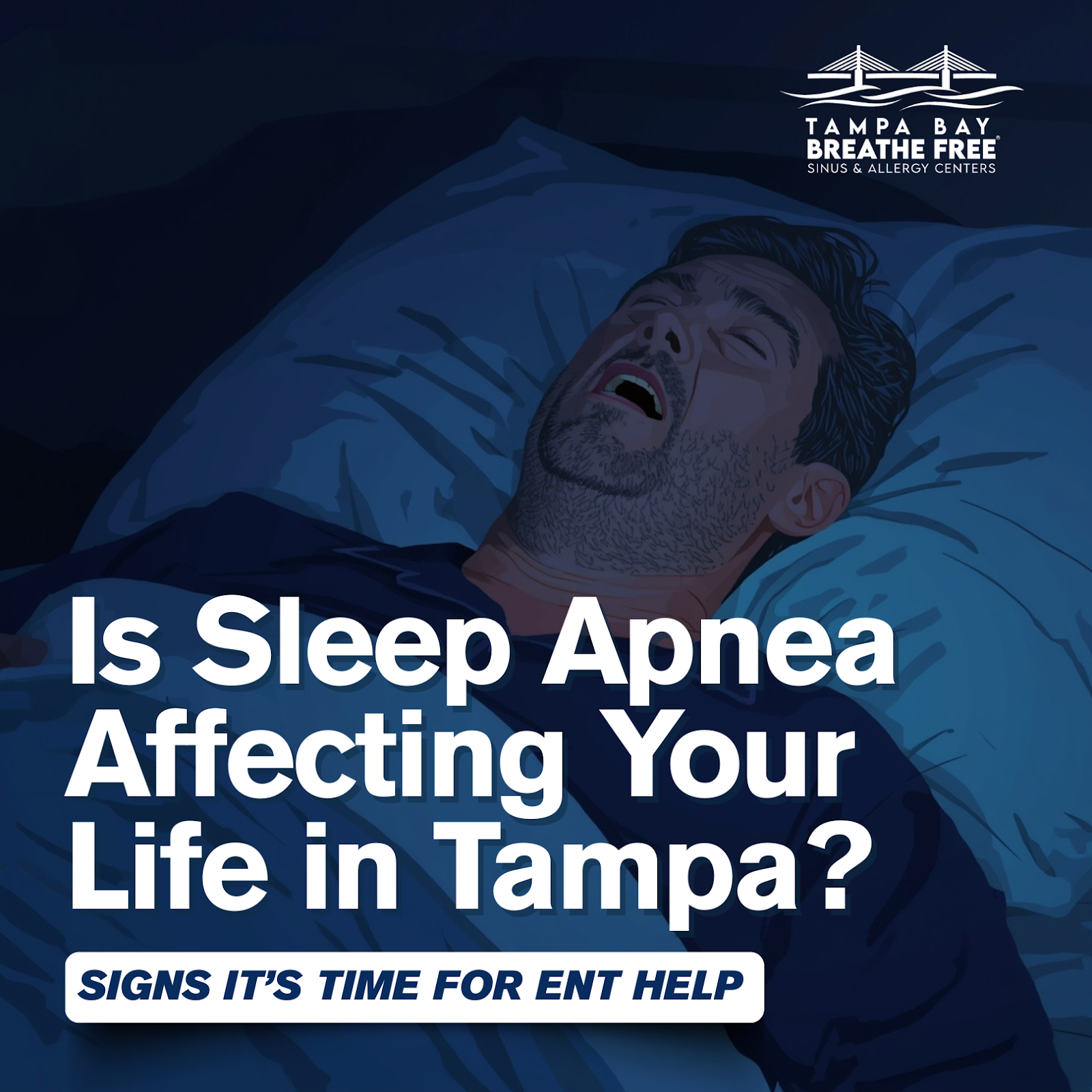.png)
Is Sleep Apnea Affecting Your Life in Tampa? Signs It’s Time for ENT Help
A good night’s sleep should leave you feeling refreshed, not drained. But if you’re waking up tired, dealing with loud snoring, or struggling to focus during the day, sleep apnea could be to blame. This condition interrupts breathing repeatedly during sleep, which can affect your energy, concentration, and overall health. Let Tampa Bay Breathe Free Sinus & Allergy Centers help you.

Snoring: More Than Just a Nuisance
Snoring might seem harmless—annoying for your partner, maybe, but not a big deal. The truth is, loud, chronic snoring is one of the most common signs of sleep apnea. When the airway is blocked, the vibration of soft tissue in the throat produces that familiar rumbling sound.
While occasional snoring isn’t always a cause for concern, consistent loud snoring—especially when paired with pauses in breathing—shouldn’t be ignored. Over time, untreated sleep apnea can increase your risk for heart problems, high blood pressure, and other serious health issues.
Fatigue That Doesn’t Go Away
We all have the occasional rough night. But if you wake up exhausted even after 7–8 hours in bed, it’s worth looking closer. Sleep apnea disrupts deep, restorative sleep, leaving you stuck in lighter sleep stages and preventing your body from fully resting.
This constant fatigue can show up as:
- Trouble concentrating or remembering things
- Irritability and mood swings
- Falling asleep during quiet moments, like watching TV or sitting at your desk
If this sounds familiar, it’s not just “getting older” or “being busy.” It could be a sign your body isn’t getting the oxygen it needs while you sleep.
Other Warning Signs to Watch For
Sometimes, the signs of sleep apnea aren’t obvious. You might not even realize how often you stop breathing during the night unless someone else points it out. That’s why it helps to pay attention to other patterns, such as:
- Waking up with headaches
- Feeling short of breath in the night
- Grinding your teeth while you sleep
- Frequent trips to the bathroom at night
If you notice more than one of these, it’s time to take them seriously.
How an ENT in Tampa Can Help
Many people don’t realize that an ear, nose, and throat (ENT) doctor can play a key role in diagnosing and treating sleep apnea. An ENT can check for structural issues—like enlarged tonsils, nasal blockages, or a deviated septum—that might be making your symptoms worse.
Depending on what’s causing your sleep apnea, long-term solutions can include:
- Minimally invasive procedures to open nasal or throat passages
- Lifestyle adjustments tailored to your specific triggers
- Coordinated care with sleep specialists for CPAP therapy or alternative treatments
The goal is to identify contributing factors and provide treatments that may improve breathing and sleep quality.
When to Get Tested
If you’ve been dealing with snoring, unexplained fatigue, or other signs of sleep apnea for more than a few weeks, don’t wait. If left untreated, sleep apnea has been associated with increased risks of health conditions such as high blood pressure, stroke, and diabetes.
Testing is simple and can often be done with a home sleep study. The sooner you know what’s going on, the sooner you can start treatment—and the sooner you can get your nights (and your energy) back.
Sleep Better, Live Better
Living in Tampa means plenty of sunshine, but if you’re constantly running on empty, you can’t enjoy it fully. Sleep apnea is common, and in many cases, treatment options are available that can help manage symptoms effectively.
If you’re ready to stop guessing and start sleeping better, Tampa Bay Breathe Free Sinus & Allergy Centers can help you find the solution that works for you.
The information provided in this article is for informational and educational purposes only and does not constitute medical advice. It is not intended to diagnose, treat, cure, or prevent any disease or medical condition. Always seek the guidance of your physician or other qualified healthcare provider with any questions you may have regarding a medical condition or treatment.
Results may vary: Treatment outcomes and health experiences may differ based on individual medical history, condition severity, and response to care.
Emergency Notice: If you are experiencing a medical emergency, call 911 or seek immediate medical attention.




